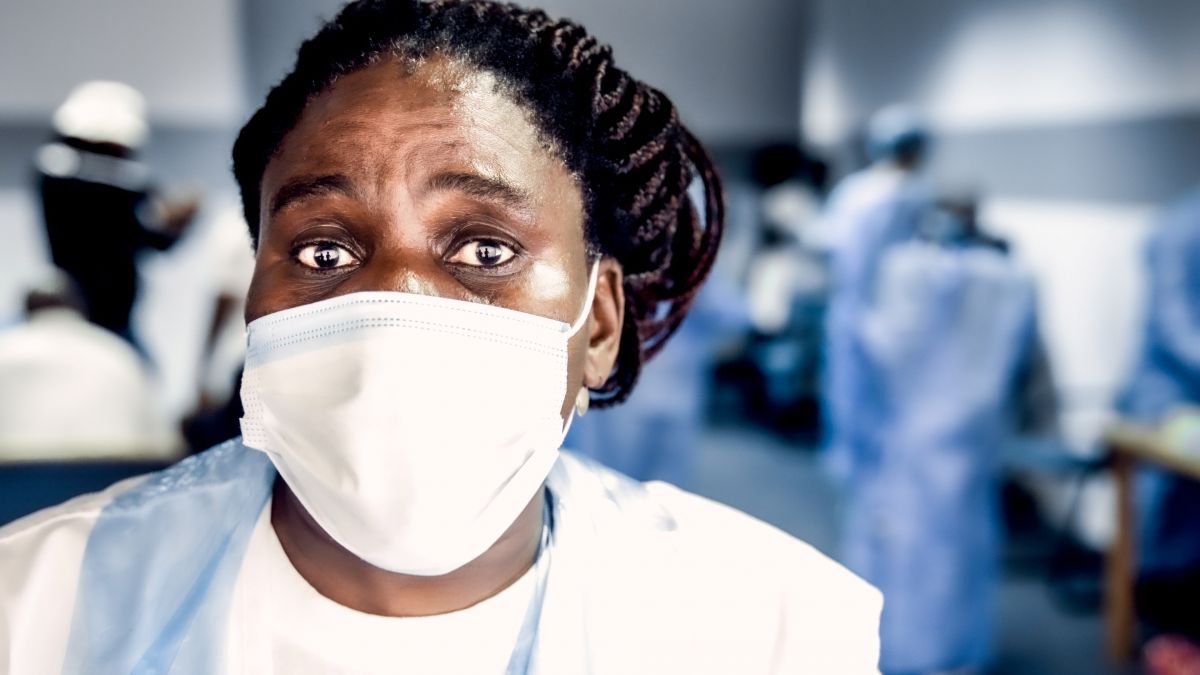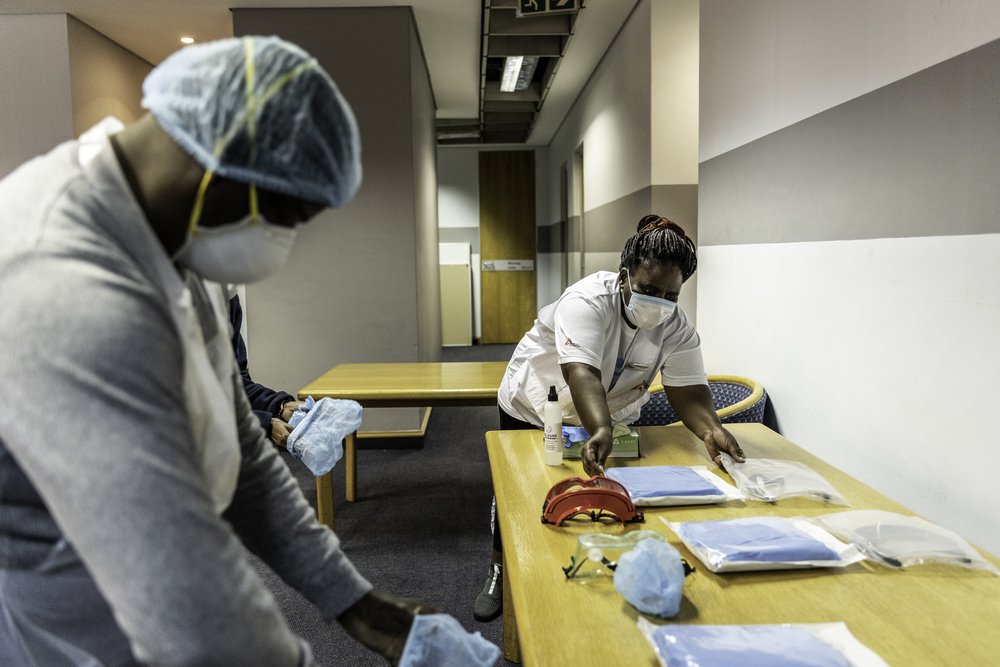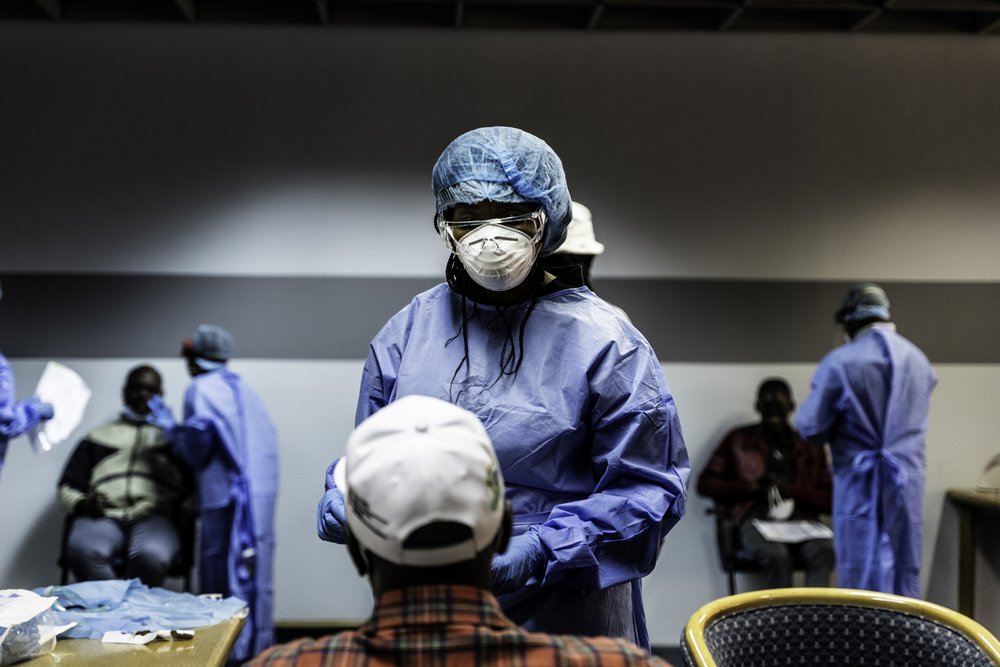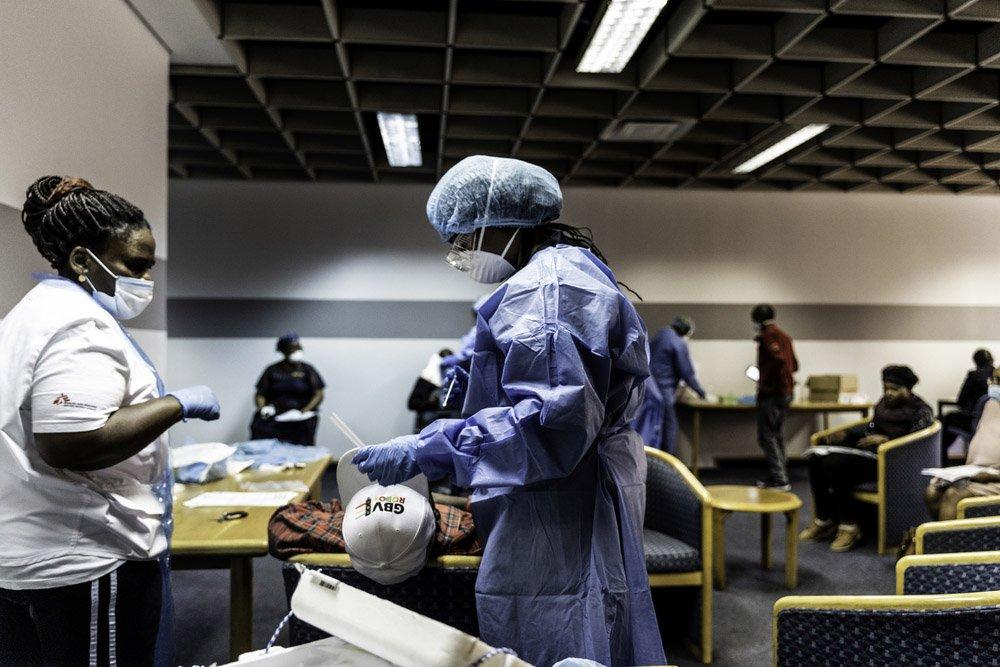It’s the last day of April 2020 – one day before the end of a level 5 lockdown in South Africa – and almost 40 days since Doctors Without Borders (MSF) forensic nurse Bhelekazi Mdlalose started working as a COVID-19 contact tracer in Johannesburg and Tshwane.

As a contact tracer Bhelekazi follows up on people who may have had close contact with someone who is COVID-19 positive and screens them – by asking a series of questions and checking their vitals – to determine whether a test is required. If a test is necessary, the person is swabbed and samples are sent to the lab.
As South Africa has scaled up testing measures, Bhelekazi has been doing both contact tracing and testing. On any given day she can test up to 150 people, so mass testing like the one we’re walking into doesn’t bother Bhelekazi in the slightest. In fact, she’s on her way to another mass testing at a Joburg mini-bus taxi rank as soon as she’s finished with this one taking place at a government department in town.
“I’ve been called to check up on the people we trained yesterday,” she explains. “They will be performing their first COVID-19 tests this morning, so I am here to mentor them.”
Inside the training-turned-testing room, Bhelekazi gathers her mentees and lays out the goggles, gowns, face masks, shoe protectors and gloves they need to put on. Large bottles of hand sanitiser are lined up on the desk. “You need to start with your shoes, as they are the dirtiest. After that, sanitise your hands and then put on your gown, goggles, mask and gloves,” she says.

“Nervous but ready” is how one of the newbie testers says she’s feeling. The three mentees kit up and soon start commenting on how hot the personal protective equipment (PPE) makes them feel. Goggles become steamy and are quickly replaced with protective visors. After a quick reminder about the swabbing process, the mentees are ready to go.
The people being tested are a mix of nervous, reluctant and irritated individuals. The testers must put everyone at ease by explaining exactly what is going to happen and what they are doing at all times. “The person needs to understand why they’re being tested and how we are going to test,” says Bhelekazi. “If they don’t understand they are reluctant to co-operate.”
The mentees ask their first clients to put their heads back, open their mouths wide for the throat swab and – most importantly – try and relax, even if they want to gag. The first test swabs are done under Bhelekazi’s eagle eye and they go well.
“Most people I’ve trained didn’t really need to be shown how to swab because they are healthcare workers, but they are scared of doing it,” she says. “They think, ‘what if I get COVID-19?’ Me being there telling them I’ve been doing this for almost two months now helps. I closely monitor myself for any symptoms and so far I’m still working. It makes me feel good to reassure them.” Training and passing on skills is something that Bhelekazi is familiar with, having worked with MSF for several years.

As an emergency humanitarian organisation, MSF must constantly transfer relevant skills to others, especially in local departments of health, so that our field workers can move on to dealing with the next emergency. “When MSF leaves, we leave the skills behind,” explains Bhelekazi.
For the last several weeks, Bhelekazi has been training health workers employed by the National Department of Health to do COVID-19 testing in Gauteng. “I’m doing training now more than anything,” she says, “I’ve learned a lot, myself.”
The other crucial role Bhelekazi has played as a contact tracer is correcting misinformation and challenging problematic perceptions of the virus. “People are fearful of dying, and from what I can see the information is lacking whether you’re living in a suburb, a township or other inner-city communities. So, yeah, people are asking a lot of questions,” she says.
“I’ve learned that people need information. When tracing and testing we’ve had people running away because other residents were saying, ‘we don’t want them here’. There's a lot of wrong information that is being disseminated on WhatsApp and by word of mouth. We have to speak to people and make them understand what is happening. We still need to do a lot in terms of teaching our communities about COVID-19.”
About MSF’s COVID-19 Response
MSF teams are participating in the national COVID-19 response by working with the Department of Health in four provinces where MSF runs projects: Western Cape, Gauteng, KwaZulu-Natal and North West. In Gauteng, MSF nurses and drivers are supporting contact tracing and testing, while medical and support teams are providing health promotion, basic medical care and COVID-19 screening for vulnerable populations including homeless people and migrants.
